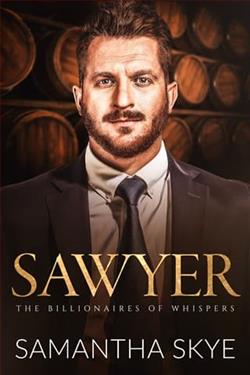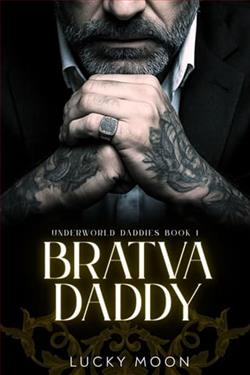Page 41 of Shadows of Justice
At least, that’s what her letters say. I’m certain that she loved him, but I’m not so sure that it was ever reciprocated.
I explain how my father used Collette to further his career at Pasadena PD, pushing her to get close to criminals so that he could learn information. It made him appear as the the hero, while she got a bed and meals off of the streets. He persuaded Collette to blend in, to experiment with the drugs the men he targeted were selling in the hopes that she would appear less suspicious and tamp down rumors that she was his rat. He was decorated and applauded and no one was ever the wiser, thinking he was just good at what he did. Her mother—my Mémé—came to America when she stopped writing and was instantly wary of my father. My mother wrote that Mémé begged her to leave him, to return to France with her so she could get clean and get back on her feet, but my mother refused.
All on account of love.
After Collette got pregnant with me, she wrote that my father changed. His already aggressive behavior became very abusive, and she almost miscarried. She wrote that she was very scared—scared for herself, and scared for the life growing inside of her. She tried get clean, tried to straighten up, but she said that she was weak. She kept using, and my father did nothing to intervene.
“Her letters said that after she had me, he kicked her out,” I say, my voice small. “She hadn’t even stopped bleeding yet. The cops turned their backs anytime she called for assault or to challenge him for custody, considering they were in his back pocket. By then, she was too ashamed to reach back out to Mémé, who didn’t have much of her own money to help even if she’d known. She had nowhere to go. Her dated letters don’t continue after that point in her life, so there’s no way to be entirely sure what happened to her after that. However, my father was informed around my third birthday that she was found dead on the streets. Hepatitis C.”
I don’t even recognize the raw vulnerability in my own voice. I can feel Leo’s gaze on me, but I can’t bring myself to look at him. I’ve never talked in this much detail about Collette with anyone. Not even Gavin.
He was too shiny for my rusty past. It made me feel like a project. I hid all my skeletons, praying he’d continue to accept me, pretending they weren’t all banging on the closet doors of my soul. But Leo, as he listens, I can tell there’s no judgment there. No pity—he just sees me. He sees me for who I am now, scars and all, and doesn’t turn tail and run.
Leo tells me about growing up in Colombia, about the small and poor town that he was from, and how he would take the bus for two and a half hours each way to go to a larger high school every day in the hopes that he could get a scholarship for college. He was a natural at soccer—or, fútbol—but had dreams of academia in America. He saw the sport scholarship as his ticket to get a finer education, and his hard work on his studies and sport performance paid off, granting him scholarship entry to the Universidad de Los Andes in Bogotá.
After his bachelor’s in chemistry was completed, he applied to be a transfer in the grad school program for chemical engineering at CalTech in Pasadena. He was accepted, and packed up his life to begin living his American dream.
“The program was tough, but I was prepared,” Leo says. “The problem was, some of my undergrad credits didn’t transfer correctly from Colombia, and I was in danger of losing my scholarship. I was forced to put my program on hold and get a job, working each semester to pay for the upcoming one, to fill in the blanks of what I was missing. I was really only able to afford one class at a time.” Leo tells me how he worked doing whatever he could, from manual labor to hospitality. “I was so broke paying my tuition, I could hardly afford rent. I moved a lot, couch surfing when I could, but sometimes there was just nowhere to go. I didn’t have a car and shelters were overpopulated. Sometimes I got a spot. Other times . . .”
He doesn’t finish, but I can fill in the blanks. Leo slept on the street at times in order to pay for his education. He’s clearly brilliant, and I can imagine, extremely competitive in his field. He deserved his spot in that program, and had earned his way into it.
My heart clenches for him. I know what struggling in order to reach your dreams feels like, but I’ve still always had a bed to call my own. I can’t help but be impressed, knowing what he’d been faced with and still didn’t give up.
“Sometimes, no one hired me. I was still learning English, and my work experience wasn’t very impressive. A friend that let me use his couch used to throw ragers on the weekends. One party, I was talking to another CalTech chem student, and he joked that he made money on the side ‘putting his degree to good use.’ I asked him what he meant, and before he could answer me a beautiful girl came up to him. He reached into his pocket, fished out a baggie, and handed it to her in exchange for cash.” Leo’s eyes shutter, suddenly seeming to find it very hard to look at me. “I was desperate. I asked him to show me what he did, but the guy blew me off. So, I started researching.”
Leo went on to explain how he began to teach himself to manufacture party drugs like synthetic ketamine, MDMA and LSD and then sold them in order to keep food in his stomach.
“It was tough at first. I had to steal a lot of the chemicals or borrow money, which often got my ass beat,” he says, shame blanketing his features. “But, after I got a crowd of regulars to count on, I had a pretty good flow of cash.”
I keep pushing him to continue, this part of the story clearly making him feel very vulnerable. I have no intention to judge him, I just like knowing more about his life. It’s comforting in a way, knowing that someone else’s past wasn’t so beautiful, just like mine.
“Business was muy bien,” he explains. “Everyone really liked what I had, and I was finally able to rent a room in a friend’s house and finish my missing credits. I was re-enrolled into my program in the coming months, and I felt like I finally had friends—as pathetic as that sounds.”
“That doesn’t sound pathetic,” I say.
“They made me feel accepted, important. I liked being ‘the guy’ that had everything you needed. Everyone knew my name, but that’s also where the trouble started.” He empties his glass and sets it down a little too hard on the table. “I had a buddy, Sam, that did sales for me and I broke him off cash for it. But Sam had a big mouth. He sold some of my molly to some sorority girls and one of them took too much. She wound up in the hospital, assaulted by some asshole at a party while she was passed out. The university takes that shit seriously, not to mention her father was some political bigwig, so there was a huge investigation. She named Sam outright, and they brought him in.” My stomach sinks.
“And he named you,” I say, wincing.
“He sang like a canary,” Leo says, laughing to cover the sadness that clearly lives in him. “I was stupid. I wasn’t thinking. I should have found another way to make tuition. I’m fucking lucky she didn’t die.” He clears his throat. “Thankfully, because I paid rent in cash I didn’t have an official address, so I had time to get rid of my tools and chemicals before they tracked me down. The police couldn’t stick anything to me with no evidence, but the university dropped me from the program because of the investigation. I was fucked, and stuck in a foreign country with no options.”
Leo stands, still not meeting my gaze, and heads to lean on the railing overlooking the view. He looks out over the city and sighs. I watch him for a moment, and can’t help but feel for him. What a shitty turn of events.
“I slipped into the black market world, and learned through trial and error how to survive on cash and aliases. I learned my lesson though—I’ve stayed out of recreational drug trafficking. There are plenty of other things people will pay good money for, things that don’t risk the overdose of a nineteen-year-old.” His jaw clenches again at his mention of the girl. “I got good at being invisible, at keeping my name out of everyone’s mouth, and learned to never try to be anyone’s ‘guy’ ever again. Now, I’m the figure at the top, calling the shots in my own network, but haven't ever trusted anyone with my identity. It’s worked, for a while. Has for ten years, actually.”
“Never gotten tired of being anonymous?” I ask hesitantly, coming to lean on the railing next to him. He turns his dark gaze on me, the light from the crackling fire pit behind me making his eyes sparkle. He looks reluctant to speak, and scrapes at the paint on the railing.
“Life throws things at you that you’d never expect. And some things just aren’t obtainable illegally. There are definitely downsides.”
Something in his voice compels me to pry for more information, my curiosity burning, but he’s already shared a lot of himself and I don’t want to push too far.
“Obligations,” I say simply, and he smiles, nodding.
“Sí, obligations.”
Chapter Thirteen - The Off Switch
Sunday, July 19th















